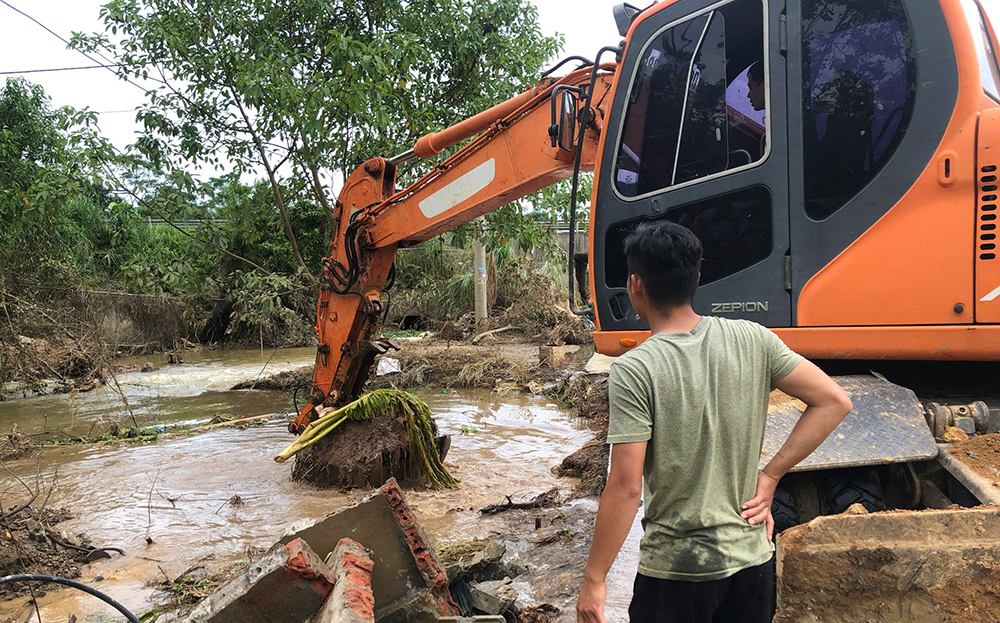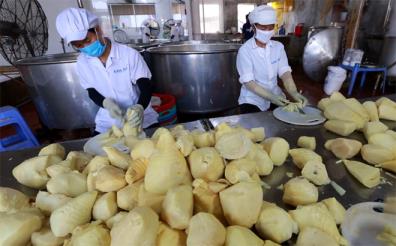In recent days, aquaculture households have been focusing on recovering from the consequences of the storm while implementing environmental management measures for farming areas, repairing damaged ponds, lakes, and cages to prepare for the new farming season.
In Minh Quan Commune, Tran Yen District, 333 households have been affected, with a total damaged area of nearly 140 hectares, accounting for over 70% of this area. Currently, as the water recedes in some areas, people are cleaning their ponds to prepare for refilling them and releasing new fish stocks.
Ms. Nguyen Thi Thuy from Lien Hiep Village shared: "Typhoon No. 3 completely flooded our family’s fish pond, and all the fish were swept away. Right after the water receded, we drained the pond, cleaned it, and disinfected it with lime powder. Now, we're just waiting to release the next batch of fish".
To promptly address the aftermath and minimize the damage caused by the storms, the Department of Agriculture and Rural Development has requested that the People's Committees of districts, towns, and cities focus on decisive leadership and guide the people in restoring aquaculture production after the storm.
For cage fish farming in rivers and reservoirs, it is essential to check the environmental factors where the cages are located to ensure they are within permissible limits; harvest immediately if the fish have reached marketable size; reinforce the mooring and buoy systems, and clean the cages and nets to ensure safety for the resumption of normal production. Farmers should repair and strengthen the fish cages, clean the farming area, disinfect the water source, and only then release new stock. It is important to follow the correct farming procedures and apply comprehensive disease prevention measures.
For pond fish farming, it is advised to drain the surface water to reduce the amount of rainwater in the pond. Farmers should run aerators and water circulators to prevent , especially in high-density intensive farming ponds. Regularly monitor the health of the fish, enhance their resistance, and adjust the feed amount accordingly. Handle dead fish properly as per regulations to prevent environmental pollution.
Mr. Hoang Huu Do, Director of the Department of Agriculture and Rural Development, stated: "The agriculture sector estimates that after recovery, the aquaculture output will reach 2,005 tons, which is an increase of 5 tons compared to the damaged yield. The total annual output is expected to reach 14,605 tons, exceeding the target of 14,600 tons set in the Provincial Party Committee's Action Program 188".
In addition to technical guidance, the specialized department recommends that farmers proactively purchase large-sized, fast-growing fish breeds for farming. This approach aims to increase productivity and meet the province's production targets for 2024.
It is known that at the 19th session of the Provincial People's Council (2021–2026 term) has passed a resolution outlining specific provisions and support measures for agricultural production losses caused by Typhoon No. 3 (Typhoon Yagi) in 2024 in Yen Bai Province. According to the resolution, traditional fish farming areas that suffered losses of over 70% will receive 20 million VND per hectare, while areas with damage between 30% and 70% will receive 10 million VND per hectare.
YBO








